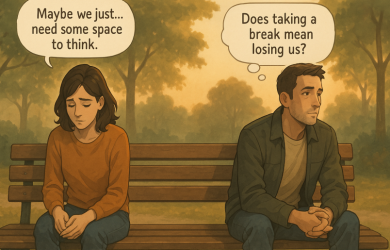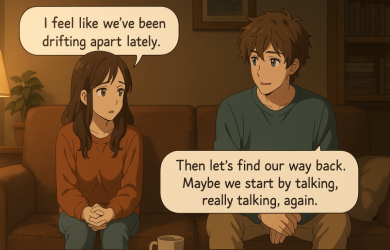Is a Break a Breakup, or Can It Mean Something Else?

Unlock Daily 30-Sec Tips for a Happier Relationship
👉 Subscribe FREEKey Takeaways
Marriage.com AI Quick Summary
Navigating a relationship break can be confusing, as the line between a temporary pause and an impending breakup is often blurred. Many ponder, “Is a break a breakup?”
Unraveling this ambiguity is crucial, and recognizing the signs that a break might evolve into a breakup is essential for nurturing open communication and understanding in any relationship.
What is a “relationship break?”
A relationship “break” is a period during which partners temporarily step back from their romantic involvement. It’s a mutual agreement to create space, allowing individuals to reflect on their needs, concerns, and personal growth.
During this time, couples often take a break from regular communication and activities, aiming to clarify their relationship’s future. However, the question lingers: is a break a breakup?
While a break implies a temporary pause, the ambiguity lies in its potential trajectory. It can be a constructive tool for self-discovery and relationship improvement or mark the beginning of an eventual breakup.
Why do couples take breaks?
Couples often take breaks for various reasons, seeking a breather to assess their relationship dynamics. Common motivations include addressing conflicts, personal growth, or reevaluating long-term compatibility. The notion of “is a break a breakup” underscores the need for introspection without immediately ending the relationship.
During this hiatus, individuals strive for self-discovery, identifying personal needs and desires. It can provide clarity on whether the relationship is worth preserving or if it’s healthier to part ways.
Ultimately, a break is a strategic pause, allowing couples to reassess their connection and make informed decisions about the future trajectory of their relationship.
7 ways to tell when it’s time to break up
Breaking up is never easy, but sometimes, it becomes necessary for the health and happiness of both partners. Recognizing when to end a relationship can be challenging, but certain signs may indicate it’s time to move on. You know it’s time to break up when:
1. Lack of communication
When open dialogue dwindles and meaningful conversations become scarce, it may indicate a growing emotional distance. Is a break a breakup? Assess if a break is merely a pause or a signal of a deeper issue.
2. Unresolved issues
Lingering problems that persist despite attempts at resolution may signal irreconcilable differences. Reflect on whether these issues are manageable or if they point towards an impending breakup.
3. Emotional disconnection
If you or your partner constantly feel emotionally detached or disengaged, it might be a sign that the connection has eroded. Consider if a break can help rebuild this emotional bridge or if it’s an inevitable step towards a breakup.
4. Individual growth
Personal development is vital, but when individual growth paths diverge significantly, it can strain the relationship. Is taking a break breaking up? Evaluate if a break can allow for personal evolution without severing the relationship entirely.
5. Lack of intimacy
Physical and emotional intimacy often wane when a relationship is faltering. Assess whether the absence of intimacy is a temporary phase that a break might remedy or if it points toward a more permanent separation.
6. Recurring arguments
Constant disagreements without resolution can create a toxic environment. Reflect on whether these conflicts are manageable with a break or if they signal the need for a definitive end.
7. Gut feeling
Trust your instincts. If you find yourself constantly unhappy or doubting the relationship’s viability, it might be time to question whether a break is a temporary fix or if a breakup is the necessary next step.
How to tell if a relationship break is a good or bad idea
Deciphering whether a relationship break is a wise decision hinges on introspection and communication. Is a break a breakup? First, define the purpose: Is it to gain perspective, resolve issues, or test compatibility?
If both partners mutually seek growth and space, it can be constructive. Conversely, if the motivation is escapism or avoiding tough conversations, it may lead to a breakup. Evaluating intentions and setting clear expectations is crucial in determining if it’s a positive step for relationship health.
Regular communication during the break is essential to answer the question, “Is it a break or a breakup?” Open dialogue ensures both parties remain aligned in their intentions and understand the potential outcomes.
7 ways to deal with the aftermath of a breakup
Coping with the aftermath of a breakup can be challenging, but with time and self-care, healing is possible. Here are seven strategies to navigate the emotional aftermath:
1. Allow yourself to grieve
Breaking up often involves a sense of loss, and allowing yourself the time and space to grieve is crucial. Recognize and accept the pain you’re feeling.
Understand that grieving is a natural part of the healing process. Remember, is a break a breakup? If the separation follows a break, acknowledging this distinction can aid in processing emotions.
2. Seek support
Don’t hesitate to reach out to friends, family, or a therapist for support. Talking about your feelings can be cathartic, and a strong support system can provide comfort during this challenging time.
Share your experiences, and if relevant, discuss whether the initial break raised questions about is a break a breakup.
3. Establish boundaries
If possible, establish clear boundaries with your ex-partner. This might involve limiting or cutting off contact for a period to facilitate emotional healing. Clearly communicate your needs and expectations. Understanding the dynamics of a breakup can help set healthy boundaries post-breakup.
4. Focus on self-care
Invest time and energy in taking care of yourself. Engage in activities that bring you joy and relaxation. Exercise, eat healthily, and ensure you get enough rest. Practicing self-care is essential for rebuilding your emotional well-being after a breakup, especially if there’s confusion about a breakup.
5. Reflect on the relationship
Reflecting on the relationship can provide valuable insights. Consider what you’ve learned about yourself, your needs, and your expectations from a partnership.
If the breakup followed a break, assess whether the initial reasons for the break raised questions about “Is a break a breakup?” This self-reflection can contribute to personal growth.
6. Set new goals
Use this period of transition to set new personal and professional goals. Channeling your energy into constructive pursuits can give you a sense of purpose and accomplishment.
Focus on activities that contribute to your overall well-being and reinforce the idea that life continues, even if it is a break or a breakup.
Watch Andrew D. Huberman, an American neuroscientist, as he explains the worst things to do after a breakup and how you can avoid it in this video:
7. Be patient with yourself
Healing is a process that takes time. Allow yourself the patience and understanding to navigate the ups and downs. It’s normal to experience a range of emotions, from sadness to anger.
Remember, is a break a breakup? Acknowledge your feelings without judgment, and gradually, you’ll find yourself on the path to recovery.
FAQs
Navigating the complexities of relationship breaks can be perplexing. Understanding the distinction between a break and a breakup is crucial for clarity and communication. In this section, we address common queries, providing insights to help you discern whether a break is a breakup.
-
How long is a typical relationship break?
The duration of a typical relationship break varies widely, as there’s no one-size-fits-all answer. It hinges on the specific needs and goals of the individuals involved. Importantly, does a break mean a breakup?
The timeline depends on the purpose of the break—whether it’s for reflection, personal growth, or addressing specific issues.
-
Should I tell my friends and family that we’re on a break?
Deciding whether to share the news of a relationship break with friends and family depends on personal comfort and the relationship’s dynamics. Consider the potential impact on your support system.
Ask yourself, is taking a break a breakup? If clarity is sought through privacy, keep the information confidential; sharing might provide valuable insights and perspectives if support is needed.
-
Can I date other people during a relationship break?
Whether dating other people during a relationship break is acceptable depends on mutual agreements. Communication is key. Reflect on the purpose of the break and discuss expectations.
Does a breakup mean it’s over? Clarify boundaries and intentions to ensure both parties are on the same page regarding exclusivity and the potential outcomes of the break.
-
What should I do if my partner wants to take a break and I don’t?
Open and honest communication is crucial when facing differing desires for a break. Discuss concerns, intentions, and the reasons behind each perspective. Explore together what is the difference between a break and a breakup.
Establish clear expectations and boundaries. Be aware that understanding may evolve, so navigate carefully to avoid the possibility of turmoil when a break turns into a breakup.
Summary
The aftermath of a breakup marks a profound phase of personal growth. By placing a premium on self-care, actively seeking support from friends, family, or professionals, and engaging in thoughtful reflection on the intricacies of the relationship, you are laying the groundwork for emotional recovery.
If the complexities of “Is a break a breakup” continue to linger, considering counseling or a relevant course may offer additional avenues for comprehensive healing and personal development. Remember, the path to recovery is unique for everyone, and embracing tailored solutions can facilitate a healthier and more empowered post-breakup narrative.
 Tips
Tips
Write your tip or submit a video tip
All tips are reviewed before the publishing.
Share this article on
Want to have a happier, healthier marriage?
If you feel disconnected or frustrated about the state of your marriage but want to avoid separation and/or divorce, the marriage.com course meant for married couples is an excellent resource to help you overcome the most challenging aspects of being married.
Recent Articles
Related Quizzes
Unlock Daily 30-Sec Tips for a Happier, Healthier Relationship
👉 Subscribe FREE on YouTube We'd love your feedback!
We'd love your feedback!
 Expert Q&A
Expert Q&A
Ask your question related to this topic & get the support you deserve from experts.



















 Thanks for your feedback!
Thanks for your feedback!